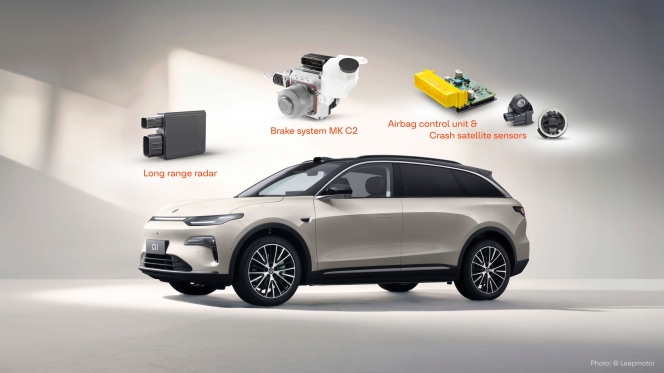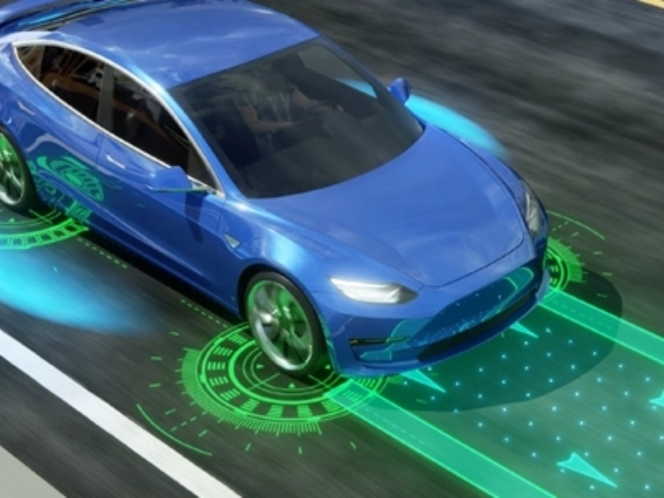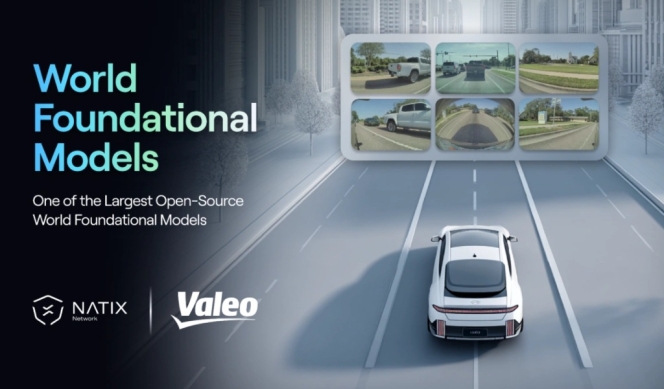VVDN Inaugurates Global Innovation Park
- By MT Bureau
- July 02, 2020
VVDN Technologies’ new Global Innovation Park (GIP) in Manesar goes live. The new facility will increase its current capacity multifold for electronic product engineering and manufacturing for a wide range of innovative versatile solutions including 5G Equipment, Trackers, Dashcams, Cameras, Wi-Fi Access Points.
Inaugurating the facility via video conference, the Union Minister for Road Transport & Highways, Shipping and Micro, Small and Medium Enterprises, Nitin Gadkari, said, "It is an achievement for Government of India's vision for an 'Atamanirbhar Bharat' when Indian Tech companies like VVDN take on the challenge of Designing and Manufacturing high-tech electronic products and components in India and set their eyes for global success."
Stating VVDN as a success story, Minister highlighted the need for import substitution, cost effective, pollution free, indigenous product manufacturing in India. He added that VVDN's Global Innovation Park, where under one roof all facilities of international standard designing, testing laboratories and production basis international standards will be done is futuristic and the way forward.
Spread across 10 Acres, VVDN's GIP is marked with R&D and electronic manufacturing facility. It is one-of-its-kind of facilities in India which has the capacity to accommodate 100,000 people over the next three years. VVDN Technologies was founded in 2007, with an aim to provide excellent engineering and manufacturing services to its customers. Since then company has been working on next generation technology innovation and have set up R&D centers across India as well as best in class manufacturing facilities in Manesar. With the new GIP facility, VVDN will have a multifold increase in its current capacity for electronic product engineering and manufacturing for a wide range of innovative versatile solutions including 5G Equipment, Trackers, Dashcams, Cameras, Wi-Fi Access Points.
Bhupender Saharan, CEO, VVDN, said, "The inauguration of GIP is an important milestone in the company's ongoing efforts to help India emerge as a hub of engineering innovation excellence and robust manufacturing. This Global Innovation Park, along with 10 other R&D centers, four manufacturing facilities across the country, will help us to continuously innovate on the latest technologies especially in the 5G, Wifi, Cloud, Vision IoT space. Having put down our roots so strongly in India, VVDN now is at a place where we would be able to scale up our deliveries for our domestic and global customers. This aligns with the company's effort to increase the employment in India and eventually contributing in providing a positive impact on the economy of our country." (MT)
Leapmotor Selects Aumovio For Safety Technologies
- By MT Bureau
- February 02, 2026

Aumovio has entered a supply agreement with Chinese electric vehicle manufacturer Leapmotor to provide safety components for the carmaker’s B and C platforms.
Several models within Leapmotor’s B platform now utilise Aumovio's long-range radar, electric parking brake and airbag control unit (ACU). Models on the C platform, including the C10, C11 and C16 SUVs, feature the latest generation of the MK C2 one-box brake system, alongside the long-range radar and ACU.
The project was completed with a development cycle approximately one-third shorter than traditional automotive timelines. Aumovio attributed its speed to ‘local-for-local’ strategy in China, where the company operates 20 sites and employs around 10,000 staff. In 2024, Aumovio held a 14 percent share of market revenue in the region.
The supplied technologies include:
- MK C2 Brake System: A unit combining the master cylinder, electronic brake system, and brake booster. It is produced locally in Shanghai.
- Long-Range Radar: A sensor with a detection range of up to 280 metres, used for driver assistance across both platforms.
- Airbag Control Unit (ACU): Integrated with crash satellite sensors, these components are manufactured in Changchun.
Boris Mergell, Head of the Safety and Motion business area at Aumovio, said, “Pairing ‘China speed’ with ‘German quality’ technologies helped us to support a rapid roll-out with our latest safety technologies. This underscores Aumovio’s course towards an adaptive powerhouse that works flexibly and closely with customers to innovate. It also shows that we continue to strengthen our customer relationships in the important market China.”
The partnership supports Leapmotor’s international presence. The B10 and B05 models, which feature Aumovio's ACU and radar technology, were showcased at the IAA 2025 in Munich as part of the manufacturer's European entry.
LTTS Secures Multi-Year Deal From Automotive OEM For Engineering And R&D
- By MT Bureau
- January 28, 2026

Bengaluru-headquartered ER&D company L&T Technology Services (LTTS) has announced a multi-year engagement within its mobility segment from an automotive manufacturer. The agreement involves software, connectivity and digital engineering services across vehicle technology domains. This win follows the company’s investments in R&D labs and mobility infrastructure designed for programs with global manufacturers.
The engagement covers mobility engineering capabilities, including embedded systems, digital platforms, verification and validation, cloud integration and cybersecurity. LTTS intends to use its engineering expertise and delivery frameworks to support the customer's technology roadmap.
At present, LTTS operates 22 design centres and 100 innovation labs globally.
The agreement strengthens the partnership between LTTS and the automotive manufacturer in the area of mobility engineering. The company provides design, development, and testing services across the mobility, sustainability, and tech segments.
Alind Saxena, Executive Director and President, Mobility and Tech at L&T Technology Services, said, “We are proud to deepen our partnership with the valued customer through this strategic engagement. LTTS brings together domain-led engineering, secure development practices and excellence in global delivery to accelerate the future of premium mobility. The win reflects the trust placed in our teams and our commitment to delivering world-class engineering at scale”.
Valeo And NATIX Network Partner To Develop Open-Source World Foundation Model
- By MT Bureau
- January 25, 2026

French technology company Valeo and NATIX Network have announced a partnership to develop a multi-camera World Foundation Model (WFM). The project combines Valeo’s research in artificial intelligence and generative modelling with NATIX’s decentralised physical infrastructure network (DePIN) to create an open-source platform for autonomous driving and robotics.
The initiative aims to move beyond perception-based models by creating a system capable of predicting future states and reasoning about physical interactions in a four-dimensional environment. The model will be trained using NATIX’s data network, which has collected 600,000 hours of video data across the US, Europe and Asia over seven months. This data provides the multi-camera inputs necessary for the spatial perception required by autonomous vehicles and robots.
The partnership builds upon Valeo’s existing open-source frameworks, VaViM (Video Autoregressive Model) and VaVAM (Video-Action Model). While these frameworks were previously trained primarily on front-camera datasets, the integration of NATIX’s multi-camera network expands the AI’s field of vision to 360 degrees.
Under the open-source framework, the partners will release models, datasets and training tools. This approach is intended to allow the research community to fine-tune models and benchmark physical AI across various driving conditions and geographic regions. The collaboration seeks to accelerate the deployment of end-to-end AI models by learning from real-world edge cases captured by vehicles in operation.
Marc Vrecko, Chief Executive Officer, Valeo’s Brain Division, said, “Since our creation in 2018, Valeo’s AI research center has been at the forefront of AI research in the automotive industry, especially in the fields of assisted and autonomous driving. Our goal has always been to advance mobility intelligence safely and responsibly. By combining Valeo’s generative world modeling research expertise with NATIX’s global multi-camera data, we are accelerating both the quality and the accessibility of next-generation end-to-end AI models, enabling the research community to build upon strong open models.”
Alireza Ghods, CEO and Co-Founder, NATIX, added, “WFMs are a once-in-a-generation opportunity — similar to the rise of LLMs in 2017–2020. The teams that build the first scalable world models will define the foundation of the next AI wave: Physical AIs. With our distributed multi-camera network, NATIX has a clear advantage of being able to move faster than large OEMs.”
- Tata Technologies
- Amazon Web Services
- InnoVent 2026
- Jaguar Land Rover
- Air India
- ES-Tec Group
- Warren Harris
Tata Technologies Concludes InnoVent 2026 Engineering Hackathon
- By MT Bureau
- January 23, 2026

Tata Technologies has announced the completion of the 3rd edition of its innovation hackathon, InnoVent 2026, supported by Amazon Web Services (AWS). The initiative invited engineering students to develop solutions for mobility challenges in the automotive and manufacturing sectors. The programme received participation from 10,247 students across 404 colleges in India, resulting in 2,822 projects.
The competition focused on the theme of intelligence-driven mobility for the year 2030. Participants received over 650 hours of mentoring and training from subject matter experts to convert their concepts into prototypes. The top 10 teams presented their work at the company's Hinjewadi campus in Pune before a jury of industry leaders from Jaguar Land Rover, Air India and ES-Tec Group.
Team Drushti from CMR College of Engineering & Technology, Hyderabad, secured the first prize of INR 300,000 for a system that customises vehicle infotainment for visually impaired drivers. Second place went to Team The T-Factor from Vellore Institute of Technology, Chennai, for an AI-based breakdown prevention system. Team SwarmSync from the International Institute of Information Technology (I²IT), Pune, took third place for an intelligent fleet management solution using V2X communication.
Tata Technologies offered career opportunities to all 42 finalists involved in the top projects. Furthermore, all participants were granted one-year access to the iGETIT learning platform to study emerging technologies. The finalist projects covered areas such as blockchain for vehicle security, wireless charging for electric vehicles, and AI-led battery monitoring.
The event featured a humanoid robot that performed roles such as coordinating panel discussions and interacting with attendees. A panel of industry experts discussed the global demand for engineering talent and the impact of technology on future mobility.
Warren Harris, MD & CEO, Tata Technologies, said, "InnoVent at Tata Technologies represents our conviction that the future is shaped by those who combine engineering excellence with human purpose to engineer a better world".







Comments (0)
ADD COMMENT